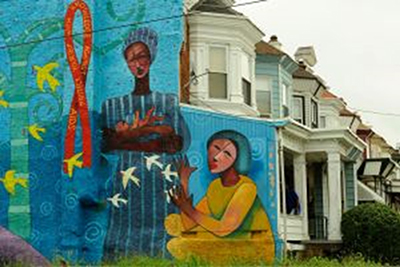
By Anoa Changa (Source NewsOne): (www.thewestsidegazette.com) – First reported by the CDC on June 5, 1981, the HIV/AIDS epidemic continues to be a pressing concern for communities across the country. On that date, the CDC documented five cases found in white, gay men, in its Morbidity and Mortality Weekly Report.

Saturday also marked HIV Long-Term Survivors Awareness Day, recognizing the lives and experiences of those living with HIV. Reflecting on 40 years since the first CDC report, President and CEO of AIDS United Jesse Milan highlighted the importance of telling a full story of the HIV epidemic.
“I have been living with HIV since 1982,” said Milan in a video message. “And I’m still here.”
Milan’s short but powerful admission is a testament to the enduring legacy of long-term survivors and those lost along the way. Even though with treatment, long-term survivorship with HIV is more commonplace, the HIV epidemic is still a pressing issue requiring serious investment.
“It’s been 40 years,” continued Milan. “HIV is still here. But we have all the tools we need to end the HIV epidemic.”
Milan also noted that the first reported case of HIV in the US was in 1969. In a Twitter thread, Dr. Oni Blackstock shared the story of Robert Rayford, a Black teenager from St. Louis who died in 1969.
Twelve years before the country would even recognize a new pneumonia, Robert Rayford died of complications later determined to be HIV. Over 50 years after Rayford’s death, Black and other communities of color continue to bear a disproportionate brunt of the epidemic.
Approximately 1.2 million living in America have HIV. While only 13% of the population, Black people account for over 40% of new cases in 2018. Black Americans also have a higher rate of death as compared to other groups.
In a statement released Saturday, President Joe Biden announced a renewed commitment to fighting HIV and AIDS. “We must continue empowering researchers, scientists, and health care providers to ensure equitable access to prevention, care, and treatment in every community – particularly for communities of color and the LGBTQ+ community,” read the statement.
Biden announced he requested $670 million in funding from Congress to “accelerate and strengthen our efforts to end the HIV epidemic in the United States.” This represents an increase of $267 million from previous levels.
The White House also announced Harold Phillips would lead the White House Office of National AIDS Policy. He previously served as the Senior HIV Advisor and Chief Operating Officer of Ending the HIV Epidemic: A Plan for America.
Established in 1993 under former President Bill Clinton, the Office of National AIDS Policy coordinates the federal response to the ongoing epidemic. Biden also recommitted the office to combat the stigma and discrimination against individuals living with HIV.
Phillips appeared Saturday as a part of the “Heroes In The Struggle” event hosted by the Black AIDS Institute. This year’s theme is celebrating Black resilience. Founded in 1999, the Black AIDS Institute is a Black-led “think and do tank” committed to ending the AIDS epidemic in Black communities.
“For 22 years, the Black AIDS Institute has led a uniquely and unapologetically Black fight to end HIV by centering Black people, organizations, and leaders,” said Raniyah Copeland, President and CEO of the Black AIDS Institute. “Heroes In The Struggle is an example of that Black Excellence, that when elevated, will lead us to the end of the epidemic.”
The event recognized the contributions of POSE co-creator and producer Steven Canals; Carmarion Anderson-Harvey, Alabama State Director for the Human Rights Campaign and Co-Chair of Black AIDS Institute’s Black Treatment Advocates Network’s Alabama chapter, and George M.Johnson – author of “All Boys Aren’t Blue.”

Be the first to comment